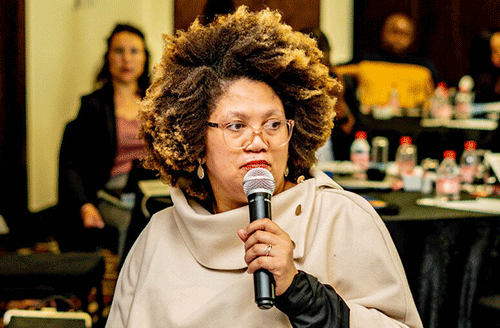Culture is not in the blood. It is not something fixed that gets passed down generations. Culture is shaped by history, geography, and shared experiences.
This is why the San, with their deep knowledge of Namibia’s arid terrain, would struggle to survive in the tundra of Siberia.
It is why an Oshiwambo-speaking Namibian, though linked by ancestry to the Great Lakes region, cannot simply return and claim belonging there. And it is why Afrikaners, whose identity has been shaped by the harsh beauty of South Africa and Namibia, will lose their culture if they leave.
A.G. Visser reflects in his poem “Amakeia” on the Afrikaner’s connection to Southern Africa:
Saggies neurie Amakeia
(Softly hums Amakeia)
op die wal van Kei-rivier,
(on the bank of the Kei River,)
tot hy slaap, die tere wiggie
(until he sleeps, the delicate little one)
van die blanke pionier…
(of the white pioneer…)
Regardless of how their ancestors arrived, the reality is that we now have white Africans. People whose lungs breathe the hot Namib desert air, whose diabetic wounds heal under the dry stretch of the Karoo, who read the land like a book passed down for generations. Their culture is no longer Dutch or European — it is now Southern African.
And while we recognize their culture and their right to live in Africa, they must also extend the same respect to native Africans. They loudly support Israel’s claim to ancestral land, yet they refuse to acknowledge the historical theft of land in Southern Africa. They turn a blind eye to the vast tracts of land their families have occupied since 1652 — land for which their ancestors could not produce a modern-day title deed.
Afrikaners are quick to criticise corruption in African governments, yet they rarely reflect on their own corrupt ways of acquiring and keeping land. The townlands and farms they lease for 99 years at a pittance, the lobbying and backroom deals that ensure their industries remain protected at the cost of young, emerging native Africans — these are acts of systemic corruption.
Their privilege is not just something from the past; it is reinforced daily through economic and political maneuvering.
Amakeia had belowe
(Amakeia had promised)
toe haar nonna sterwend was,
(when her mistress was dying,)
om die hulpelose kindjie
(to take care of the helpless little child)
tot hy groot was, op te pas.
(until he was grown up.)
However, it must also be acknowledged that Afrikaners paid a terrible price in African history. The Anglo-Boer War and their resistance against British rule meant Southern Africa was not just used as a mere extraction site for raw materials. Their fight ensured Southern Africa developed into an industrial economy.
But this came at a heavy cost — 30 000 women and children were brutally killed in British concentration camps. This brutal method of mass killings began here. It is unfortunate that many of their leaders later chose to “hensop” to the British and, in doing so, sold out both the native Africans and ordinary Afrikaners.
Despite this history, some Afrikaners made lasting contributions. Hendrik van der Bijl, the brilliant engineer, developed Eskom, laying the foundation for modern electricity infrastructure. This is by no means to say that native Africans did not make extraordinary contributions, but rather to acknowledge that Afrikaners, too, have a rightful heritage on this continent.
The truth is, as much as Afrikaners did not create Afrikaans, they promoted this language into a scientific lingua franca without which Namibia’s and South Africa’s economies cannot hold together. A resilient language that stands as testimony to the struggles of all the people who speak it.
As Max du Preez wrote in The Daily Maverick on Wednesday, 12 February 2025, in his column “We Afrikaners are once again skunks”, “White unemployment is lower than in any other group; not a single farm has been confiscated since 1994; white South Africans remain overwhelmingly wealthier per capita than black and Coloured citizens; people are not being attacked on farms because they are white and Afrikaans; Afrikaans is thriving more than any other indigenous language; and the Constitution protects fundamental human rights and the rule of law.”
The same is true for Namibia, a country that shares an umbilical cord with South Africa in history, politics, and economics. Afrikaans speakers are entitled to promote and preserve their language, but Afrikaners who have made Afrikaans their own are not victims.
Along with other white South Africans, they remain privileged and vastly overrepresented in professional and economic spheres.
Liefd’ryk sorg sy vir die wit kind,
(Lovingly she cares for the white child,)
tot vir hom die lewenslig
(until for him the light of life)
straal uit aia Amakeia’s
(shines from nanny Amakeia’s)
vrind’lik-troue swart gesig.
(kind, loyal black face.)
Like Amakeia, who lovingly raised the child of the white pioneer, Afrikaners must now decide whether they will nurture and protect the land they call home — not as owners, but as equals among those who have always belonged here.
*Jemima Beukes is a journalist and justice and heritage activist.


